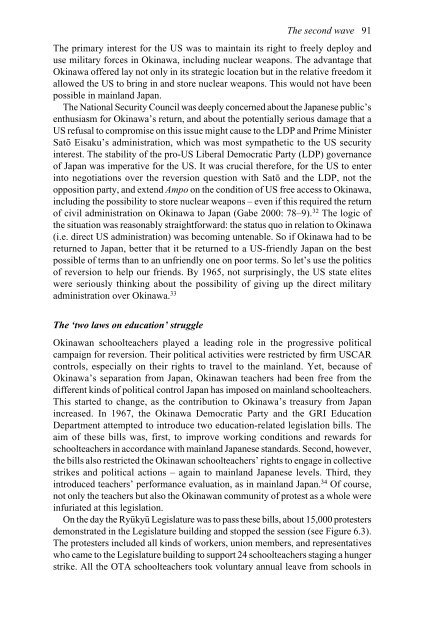Myth, Protest and Struggle in Okinawa
Myth, Protest and Struggle in Okinawa
Myth, Protest and Struggle in Okinawa
You also want an ePaper? Increase the reach of your titles
YUMPU automatically turns print PDFs into web optimized ePapers that Google loves.
The second wave 91<br />
The primary <strong>in</strong>terest for the US was to ma<strong>in</strong>ta<strong>in</strong> its right to freely deploy <strong>and</strong><br />
use military forces <strong>in</strong> Ok<strong>in</strong>awa, <strong>in</strong>clud<strong>in</strong>g nuclear weapons. The advantage that<br />
Ok<strong>in</strong>awa offered lay not only <strong>in</strong> its strategic location but <strong>in</strong> the relative freedom it<br />
allowed the US to br<strong>in</strong>g <strong>in</strong> <strong>and</strong> store nuclear weapons. This would not have been<br />
possible <strong>in</strong> ma<strong>in</strong>l<strong>and</strong> Japan.<br />
The National Security Council was deeply concerned about the Japanese public’s<br />
enthusiasm for Ok<strong>in</strong>awa’s return, <strong>and</strong> about the potentially serious damage that a<br />
US refusal to compromise on this issue might cause to the LDP <strong>and</strong> Prime M<strong>in</strong>ister<br />
Satō Eisaku’s adm<strong>in</strong>istration, which was most sympathetic to the US security<br />
<strong>in</strong>terest. The stability of the pro-US Liberal Democratic Party (LDP) governance<br />
of Japan was imperative for the US. It was crucial therefore, for the US to enter<br />
<strong>in</strong>to negotiations over the reversion question with Satō <strong>and</strong> the LDP, not the<br />
opposition party, <strong>and</strong> extend Ampo on the condition of US free access to Ok<strong>in</strong>awa,<br />
<strong>in</strong>clud<strong>in</strong>g the possibility to store nuclear weapons – even if this required the return<br />
of civil adm<strong>in</strong>istration on Ok<strong>in</strong>awa to Japan (Gabe 2000: 78–9). 32 The logic of<br />
the situation was reasonably straightforward: the status quo <strong>in</strong> relation to Ok<strong>in</strong>awa<br />
(i.e. direct US adm<strong>in</strong>istration) was becom<strong>in</strong>g untenable. So if Ok<strong>in</strong>awa had to be<br />
returned to Japan, better that it be returned to a US-friendly Japan on the best<br />
possible of terms than to an unfriendly one on poor terms. So let’s use the politics<br />
of reversion to help our friends. By 1965, not surpris<strong>in</strong>gly, the US state elites<br />
were seriously th<strong>in</strong>k<strong>in</strong>g about the possibility of giv<strong>in</strong>g up the direct military<br />
adm<strong>in</strong>istration over Ok<strong>in</strong>awa. 33<br />
The ‘two laws on education’ struggle<br />
Ok<strong>in</strong>awan schoolteachers played a lead<strong>in</strong>g role <strong>in</strong> the progressive political<br />
campaign for reversion. Their political activities were restricted by firm USCAR<br />
controls, especially on their rights to travel to the ma<strong>in</strong>l<strong>and</strong>. Yet, because of<br />
Ok<strong>in</strong>awa’s separation from Japan, Ok<strong>in</strong>awan teachers had been free from the<br />
different k<strong>in</strong>ds of political control Japan has imposed on ma<strong>in</strong>l<strong>and</strong> schoolteachers.<br />
This started to change, as the contribution to Ok<strong>in</strong>awa’s treasury from Japan<br />
<strong>in</strong>creased. In 1967, the Ok<strong>in</strong>awa Democratic Party <strong>and</strong> the GRI Education<br />
Department attempted to <strong>in</strong>troduce two education-related legislation bills. The<br />
aim of these bills was, first, to improve work<strong>in</strong>g conditions <strong>and</strong> rewards for<br />
schoolteachers <strong>in</strong> accordance with ma<strong>in</strong>l<strong>and</strong> Japanese st<strong>and</strong>ards. Second, however,<br />
the bills also restricted the Ok<strong>in</strong>awan schoolteachers’ rights to engage <strong>in</strong> collective<br />
strikes <strong>and</strong> political actions – aga<strong>in</strong> to ma<strong>in</strong>l<strong>and</strong> Japanese levels. Third, they<br />
<strong>in</strong>troduced teachers’ performance evaluation, as <strong>in</strong> ma<strong>in</strong>l<strong>and</strong> Japan. 34 Of course,<br />
not only the teachers but also the Ok<strong>in</strong>awan community of protest as a whole were<br />
<strong>in</strong>furiated at this legislation.<br />
On the day the Ryūkyū Legislature was to pass these bills, about 15,000 protesters<br />
demonstrated <strong>in</strong> the Legislature build<strong>in</strong>g <strong>and</strong> stopped the session (see Figure 6.3).<br />
The protesters <strong>in</strong>cluded all k<strong>in</strong>ds of workers, union members, <strong>and</strong> representatives<br />
who came to the Legislature build<strong>in</strong>g to support 24 schoolteachers stag<strong>in</strong>g a hunger<br />
strike. All the OTA schoolteachers took voluntary annual leave from schools <strong>in</strong>
















